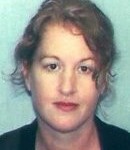
From Tech Today:
Melissa Baird (SS), published, “Heritage Ecologies and the Rhetoric of Nature” in The Rhetoric of Heritage (Kathyrn Lafrenze Samuels and Trinidad Rico—editors, University of Colorado Press).

From Tech Today:
Melissa Baird (SS), published, “Heritage Ecologies and the Rhetoric of Nature” in The Rhetoric of Heritage (Kathyrn Lafrenze Samuels and Trinidad Rico—editors, University of Colorado Press).
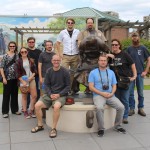
On the weekend before orientation, the Industrial Archaeology Program (SS) made a graduate-study tour to Milwaukee. Five Social Sciences faculty and five graduate students (SS and HU, both MS and PhD) investigated industrial production, adaptation to industrial decline and how urban patterns have been affected by industry, both historically and today.
The five-day trip, partly underwritten by the Chipstone Foundation of Milwaukee, included factory process tours, museum visits, and a day at Chipstone discovering explanatory and interpretive strategies for material culture, primarily using the history of the ceramics industry as the focus for the day.
Visits included the Kohler Company, which produces ceramic and cast iron bathroom fittings; Caterpillar Global Mining (formerly Bucyrus-Erie), which builds some of the largest earth-moving machinery on the planet; Harley-Davidson Powertrain Operations, where we saw engines and transmissions being assembled on a state-of-the-art assembly line; La Lune designer rustic furniture company, where small-batch artisanal woodworking is still practiced; and the Falk Foundry (Rexnord Industries) in Milwaukee, which has sadly been decommissioned in the last six months, but which offered a glimpse of active deindustrialization.
Museum visits included the Hamilton Wood Type Museum in Two Rivers (WI), the Grohmann Museum at the Milwaukee School of Engineering, which has an extensive collection of artwork depicting industrial work, and the Iron Mountain (MI) Pumping Museum. The final stop of the whirlwind tour was the Wisconsin Historical Society’s Herrling Sawmill in Greenbush (WI), a reconstructed 1850s vertical sash sawmill. The historically accurate sawmill has been reconstructed on the basis of archaeology done by Michigan Tech’s Industrial Archaeology Program in the 1990s. Sadly, the day we visited the saw blade was misaligned and a main bolt had sheared, so it was not running, but it was wonderful to see the final result of our archaeology of 20 years ago.
Taken from Tech Today.
From Tech Today:
Trials and Trails Tonight
The Carnegie Museum hosts tours of Huron Creek. Carol MacLennan (SS) and Alex Mayer (CEE) will host a pair of tours tonight. Begining at 5:30 p.m. and again at 7 p.m. the tour of Huron Creek travels from its rerouted home behind Walmart to its entry into the Portage Canal. You will learn about how area mines and other development changed the route and the ecology of Huron Creek. $25.00 per ticket ($20 members) includes guided tour and refreshments at Museum.
Seats are limited, reserve tickets by calling 482-7140 or email
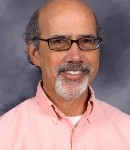 From Tech Today:
From Tech Today:
Professor Barry Solomon wrote an opinion piece on clean power plants that was published in the Battle Creek Enquirer.
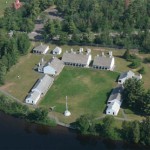
Professor Emeritus Larry Lankton will present “1,900 Lives — The Human Cost of Mining Copper” at Fort Wilkins Historic State Park in Copper Harbor on Monday, August 17, 2015 at 7:00 p.m at the West Barracks.
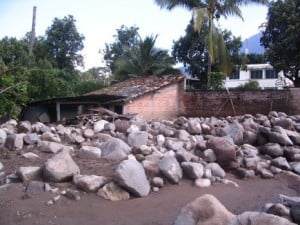 In October 2011, heavy rainfall poured down the sides of El Salvador’s San Vicente Volcano, nearly four feet of water in 12 days. Coffee plantation employees, working high up on the volcano’s slope began noticing surface cracks forming on steep slopes and in coffee plantations. Cracks herald landslides—places where the wet, heavy upper layers, saturated with water, slide over the less-permeable rocky layers underneath. The workers radioed downslope, keeping close tabs on the rainfall gauge network.
In October 2011, heavy rainfall poured down the sides of El Salvador’s San Vicente Volcano, nearly four feet of water in 12 days. Coffee plantation employees, working high up on the volcano’s slope began noticing surface cracks forming on steep slopes and in coffee plantations. Cracks herald landslides—places where the wet, heavy upper layers, saturated with water, slide over the less-permeable rocky layers underneath. The workers radioed downslope, keeping close tabs on the rainfall gauge network.
Luke Bowman was also there, helping direct radio calls and conducting fieldwork. Bowman, who recently defended his doctoral research in geology at Michigan Technological University, studies geohazards on San Vicente. The Journal of Applied Volcanology recently published some of his research, co-authored by Kari Henquinet, director of the Michigan Tech Peace Corps Master’s International Program and a senior lecturer in the Department of Social Sciences. Their work combines traditional hazard assessments with social science techniques to develop a more in-depth understanding of the risks present at San Vicente Volcano in El Salvador.
Ethnography
Incorporating social science techniques—like ethnographic interviews and participatory observations of community meetings—is no easy feat for physical scientists, who have not been trained to think that way. Collaboration is important, and Henquinet worked with Bowman on his volcanology research to round out his social science data gathering methodology.
“The ethnographic approach is immersion,” Henquinet says, explaining researchers have to learn in the field and adjust their work accordingly. “It’s an approach that’s exploratory, grounded in reality and the context that people live in, so you’re not isolating or manipulating an experiment in a lab.”
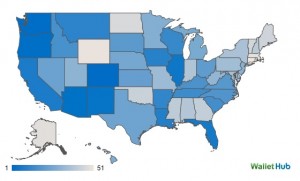 Professor Barry Solomon was recently interviewed for WalletHub’s article on “2015’s Most & Least Energy-Expensive States” that investigated various criteria that impact monthly energy costs across the nation. They looked at monthly costs for electricity, natural gas, gasoline, and home heating oil to come up with an “Total Energy Cost” for each state. These costs range from a low of $223 in the District of Columbia to a high of $410 in Connecticut (Michigan came in at #27 at $304). Because the total monthly cost is a mixture of the four energy source costs, states’ rankings are not in any immediate pattern because, as the author points out, “lower prices don’t always equate with lower costs, as consumption is a key determinant in the total amount of an energy bill.”
Professor Barry Solomon was recently interviewed for WalletHub’s article on “2015’s Most & Least Energy-Expensive States” that investigated various criteria that impact monthly energy costs across the nation. They looked at monthly costs for electricity, natural gas, gasoline, and home heating oil to come up with an “Total Energy Cost” for each state. These costs range from a low of $223 in the District of Columbia to a high of $410 in Connecticut (Michigan came in at #27 at $304). Because the total monthly cost is a mixture of the four energy source costs, states’ rankings are not in any immediate pattern because, as the author points out, “lower prices don’t always equate with lower costs, as consumption is a key determinant in the total amount of an energy bill.”
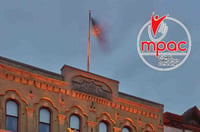 Associate Professor Adam Wellstead (SocSci) presented a paper “Beyond Adaptive Capacity: Policy Capacity and Climate Change Adaptation Assessments and Frameworks” at the Midwest Public Affairs Conference in Milwaukee on July 9-11, 2015.
Associate Professor Adam Wellstead (SocSci) presented a paper “Beyond Adaptive Capacity: Policy Capacity and Climate Change Adaptation Assessments and Frameworks” at the Midwest Public Affairs Conference in Milwaukee on July 9-11, 2015.
Wellstead chaired the Environmental Policy session. The topic of the 2015 Midwest Public Affairs Conference was “Restructuring Governance: Emerging Solutions for Advancing the Public Interest.” The conference was hosted by the UWM Department of Public and Nonprofit Administration and the Helen Bader Institute for Nonprofit Management.
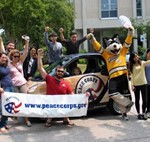 HOUGHTON — Michigan Tech’s mascot, Blizzard T. Husky, met the challenge of squeezing into the driver’s seat of the US Peace Corps’ Peace Car, which arrived on the Michigan Tech campus this afternoon — one of many stops on a Midwest Tour by representatives from the Peace Corps Midwest Region office in Chicago. The Peace Car enables Peace Corps staff to share their mission while limiting their carbon footprint.
HOUGHTON — Michigan Tech’s mascot, Blizzard T. Husky, met the challenge of squeezing into the driver’s seat of the US Peace Corps’ Peace Car, which arrived on the Michigan Tech campus this afternoon — one of many stops on a Midwest Tour by representatives from the Peace Corps Midwest Region office in Chicago. The Peace Car enables Peace Corps staff to share their mission while limiting their carbon footprint.
Michigan Tech has the greatest number of Peace Corps Masters International programs in the US. The programs — from Forestry to Environmental Engineering, Geology and more — are now in ten different MTU departments that offer a Master’s Degree combined with Peace Corps service.
Kari Henquinet, Michigan Tech Peace Corps Master’s International Program director and senior lecturer in Social Sciences, was on hand to welcome the Chicago Peace Corps team.
“They’ll come back in the fall for recruiting,” Henquinet said.